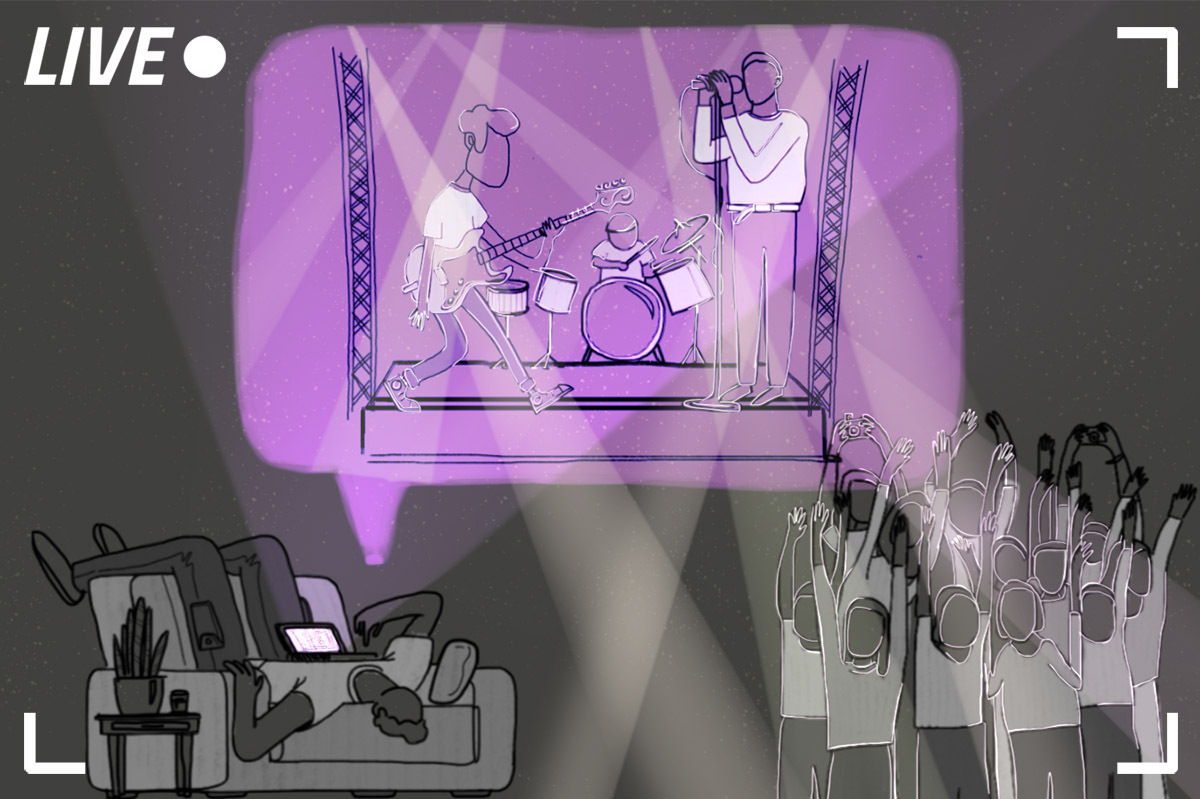COVID-19 hushed in-person performances: Have live streams sustained the demand of live music?

The COVID-19 pandemic has eradicated this year’s once in a lifetime memories and experiences that only live music could deliver. The music scene in San Luis Obispo has been adversely affected, just like everywhere else in the United States.
Without the Shabang Music and Arts Festival and downtown music venues filling SLO’s soundscape with surpassing tones of harmonies, the city is now primarily filled with the drones of automobiles, aircraft and the hourly “chiming” of the Cal Poly bell tower.
Local bands such as Autopipe, Skogen, Dudeo Perez, and Pancho and the Wizards have not shown the community the power of Cal Poly’s “learn by doing” philosophy through their usual hosting of rocking gigs at rough and ready venues in the neighborhoods.
A group like Autopipe – comprised of forestry senior Oliver Tawney (rhythm guitar), environmental earth and soil science senior Liam Graham (drums), architecture senior Arjun Urbonas (lead guitar), and city and regional planning senior Hank McKay (bass) – cannot replicate the enthusiastic authenticity of a live performance.
“We’re very much known as a live band … the live experience and the antics just doesn’t translate [through a livestream],” said McKay.
Even though the group’s must-see, live escapade cannot translate virtually, they are not ruling out an opportunity to get imaginative and perform their music differently.
“The best way to be creative is to adapt to the constraints that have been forced upon us … we are either going to sink or swim,” said Tawney. “We are going to get better at recording music and try something new [with the virtual method] and swim, or we will just kinda not and sink.”
With McKay honing his bassist skills, Urbonas making progress on a solo album, Graham tinkering with Adobe After Effects and jamming with Tawney, it looks as if Autopipe is swimming right on through this pandemic.
Skogen is using this time of not being able to perform live to add some new faces to the group and expand their overall sound. Business administration junior Erik Methot (guitar/keyboard), construction management junior Braden Hotra (bass), civil engineering junior Riley Ross (drums), guitarist Andrew Boyle, and vocalist Cameron Zirbel have taken advantage of quarantine to write material and get primed for an eventual return to live shows.
“Cameron and I have been grinding out this new record that we’ve been writing. We’re staying under the radar and transforming everything … starting from a clean slate … It’s been a good downtime,” said Methot.
Zirbel cut his teeth with San Diego rock’n’roll band Material Boys before “hopping on the Skogen train” and joining up with childhood friend Methot. Zirbel will be taking over most of the group’s vocalist duties. With a new voice and more instruments on stage, the six-piece band will have a fresh sound that will surprise those who have listened to them before the pandemic hit.
“I’m more psyched than I ever have been … the whole group has given our music a new sound, a new aroma that you’ll have to give a listen to,” exclaimed Methot.
While students have not seen their favorite artists in-person, they are eagerly waiting for their return to the stage. During this lull, live streams have become the only lifeline for all music fans. They do not entirely satisfy the demand for live music, but they are a suitable band-aid for the time being.
Alyssa Bowling, a history senior, has been keeping up with NPR’s Tiny Desk live streams since the beginning of the pandemic. The free live streams offer an intimate experience with famous artists such as Tame Impala, Billie Eilish and John Legend. Like many other fans, she appreciates the extra effort artists have been putting in to bring these performances from their homes to ours.
“It means something when artists go out of their way to do that for people who want to listen to their music. It’s pretty cool … It’s a good way for them to connect with us even if they can’t have the performance live in person,” said Bowling.
Anyone even willing to cough up a few measly dollars for live streams produced by musical festivals such as Levitation will undoubtedly get what they pay for and then some. The latest Levitation Sessions have featured acclaimed underground acts such as Ringo Deathstarr, Holy Wave and Death Valley Girls.
Each Levitation Session feels like a curated event, not just a simple virtual performance. Much like a live concert, openers feature before the headliner. The way Levitation incorporated the other bands into the show did not disrupt the main event. It did, however, bring more attention to the underground scene that makes Levitation distinct.
Each Session is available for download and viewing for two weeks after the premiere date. The latest session featured acclaimed garage rockers Osees in a well-directed, explosive performance in the middle of the desert in Pioneertown, CA. This is a far cry from the hospitable home studios featured on NPR’s Tiny Desk series.
Many charities now have a platform to raise funds using live streams. Teenage Cancer Trust, The Trussell Trust, Fighting For Me, and many other organizations have received proceeds from live stream events since the pandemic began.
Virtual performances can be a fine stand-alone product if artists and producers give them enough attention and effort. While they don’t create cherished experiences for music lovers, virtual events can provide an experience worth any fans’ time and money.
Live streams have also provided a stage for musicians to raise funds for good causes such as fighting domestic abuse, ending childhood hunger and supporting adolescents in their battles with cancer.
The pandemic has allowed musicians to connect with fans in a new way, experiment, revamp, and retune for a sensational return to live music when the time is right.
Click here to listen to the SLO bands mentioned in the article.

